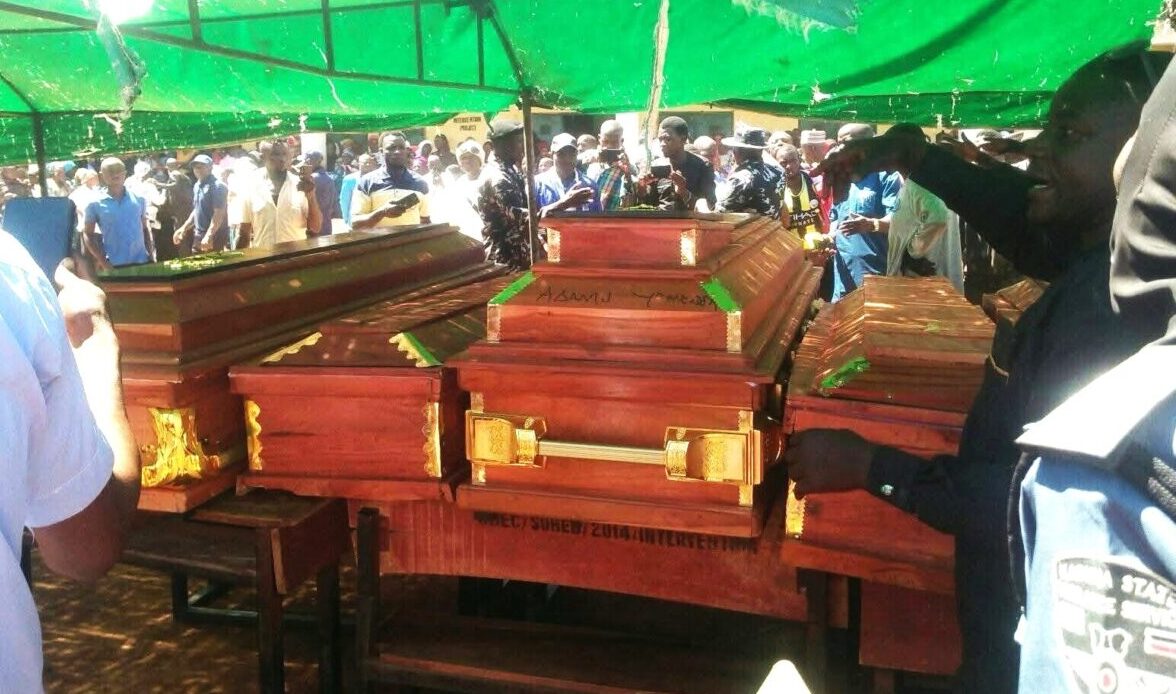Seven Christians, including a 12-year-old boy, were mourned on Saturday (Nov. 8) after they were killed in an attack in Kaduna State, Nigeria, the same day Islamic extremists burned homes and a church building in Borno State.
For more stories at your doorstep, subscribe to The Baptist Paper.
SIGN UP for our weekly Highlights emails.
At a funeral in Damakasuwa town, Kauru County in northwest Nigeria’s southern Kaduna state, hundreds of people including many from outside the area attended the service for the Christians slain on Oct. 31 by Fulani herdsmen and other terrorists, residents said.
“We have laid to rest seven of our beloved Christians who were killed by terrorists and Fulani herdsmen,” area resident Daniel Dodo told Christian Daily International-Morning Star News. “The funeral is a ceremony of tears being shed by Christians in the midst of deliberate violence against us because of our Christian faith.”
The funeral was held for Yohanna Adamu, 46; Bala Bude Chawai, 57; Yakubu Bala, 50; Abubakar Ya’u, 30; Ishaya Dauda, 56; Monday Nveneh, 46; and Savior Emmanuel, 12.
“This funeral has became a powerful display of unity, faith and shared resilience for Christians,” Dodo said. “Families wept, neighbors embraced and prayers filled the air as hundreds gathered to honor the Christian victims, innocent lives taken too soon, but never forgotten.”
The Rev. Madaki Sarki of the Evangelical Church Winning All told mourners that they were burying their loved ones but not their hope.
“Today we weep, but we also choose unity,” Pastor Sarki said. “The blood of the innocent must bind us together, to protect one another, to stand for peace, and to honor the memory of those we have lost.”
Numbering in the millions across Nigeria and the Sahel, predominantly Muslim Fulani comprise hundreds of clans of many different lineages who do not hold extremist views, but some Fulani do adhere to radical Islamist ideology, the United Kingdom’s All-Party Parliamentary Group for International Freedom or Belief (APPG) noted in a 2020 report.
“They adopt a comparable strategy to Boko Haram and ISWAP and demonstrate a clear intent to target Christians and potent symbols of Christian identity,” the APPG report states.
Christian leaders in Nigeria have said they believe herdsmen attacks on Christian communities in Nigeria’s Middle Belt are inspired by their desire to forcefully take over Christians’ lands and impose Islam as desertification has made it difficult for them to sustain their herds.
In the country’s North-Central zone, where Christians are more common than they are in the North-East and North-West, Islamic extremist Fulani militia attack farming communities, killing many hundreds, Christians above all, according to the report.
Jihadist groups such as Boko Haram and the splinter group Islamic State in West Africa Province, among others, are also active in the country’s northern states, where federal government control is scant and Christians and their communities continue to be the targets of raids, sexual violence and roadblock killings, according to the report. Abductions for ransom have increased considerably in recent years.
Nigeria remained among the most dangerous places on earth for Christians, according to Open Doors’ 2025 World Watch List of the countries where it is most difficult to be a Christian. Of the 4,476 Christians killed for their faith worldwide during the reporting period, 3,100 (69 percent) were in Nigeria, according to the WWL.
“The measure of anti-Christian violence in the country is already at the maximum possible under World Watch List methodology,” the report stated.
Nigeria ranked seventh on the 2025 WWL list of the 50 worst countries for Christians.
Full story.
EDITOR’S NOTE — This story was written and originally published by Morning Star News.
Before cameras, microphones, and social media, God’s Old Testament prophets were the original communicators—using every tool of their time to capture attention, confront culture and call people back to truth.
Virginia Baptists spent three days building on their long foundation of ministry during the Baptist General Association of Virginia (BGAV) annual meeting Nov. 10–12 at Highlands Fellowship Church, Abingdon.
Wayne Faison said Jesus provides a great picture of what pressing on looks like.
It was a celebration of tears and laughter, as messengers at the IBSA Annual Meeting honored Executive Director Nate Adams ahead of his planned retirement. Two moments stand out.
Email:
news@thebaptistpaper.org
Lost your password?
